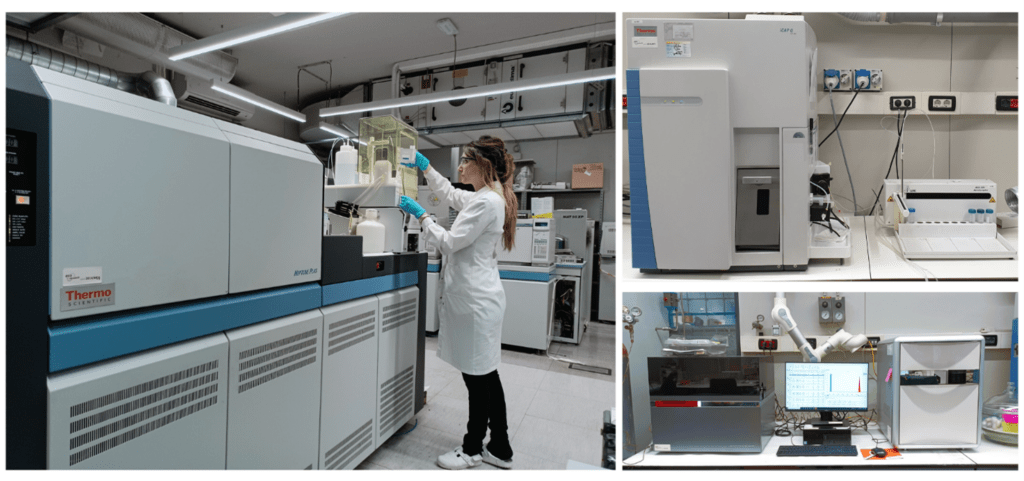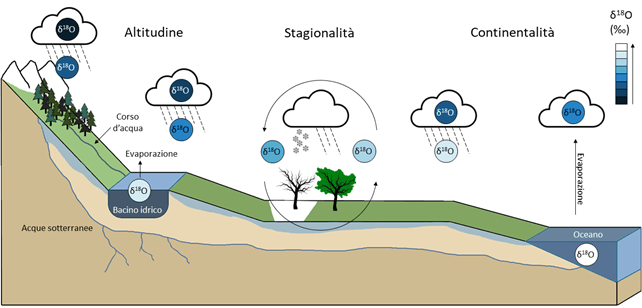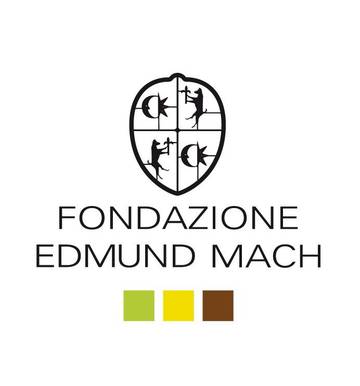Project duration: 2023-2025
Funding: Programme agreement between the Autonomous Province of Bolzano and Eco Research – three-year period 2023 – 2025
Allocated budget: 850,000€
Contact person: Agnese Aguzzoni
Project description:
Multi-chemical analysis consists of a combination of different chemical parameters for the characterisation of certain environmental compartments or matrices (e.g. water, raw materials, agro-food and forestry products). Thanks to the nature of the analyses applied, data processing makes it possible to obtain unambiguous information on the sample that is useful for tracing its history, the cycle it has gone through and its origin. The applications of these techniques are innumerable and range from environmental research to food research, from hydrology to geology.
Multi-element analysis makes it possible to profile a sample from the point of view of its inorganic chemical composition. This characterisation offers an important insight into the presence of specific elements in a given environment, from which a great amount of information can be derived. Many elements are characterised by two or more isotopes, i.e. atoms that differ only in the number of neutrons (neutral particles) in the nucleus, while retaining the same chemical characteristics. Isotopic analysis measures the variations that exist between two isotopes in terms of relative abundance, which are often minimal and can be attributable to various processes, e.g. biochemical, climatic, decay depending on the element studied. Again, data analysis allows the isotopic datum to be associated with the history of the sample, in relation to its environmental compartment, its mixing between different matrices, its pathway and its origin.
At Eco Research there is a specialised laboratory for multi-element and multi-isotopic analysis (of both light and heavy elements), including an exclusive space dedicated to sample preparation, and several mass spectrometers, high-performance and sophisticated instruments dedicated to this type of analysis. Thanks to the considerable skills it has acquired over the years, Eco Research’s staff is highly qualified and competent in this field, as demonstrated by the numerous collaborations it has in Trentino-Alto Adige (Free University of Bolzano, Laimburg Research Centre, Edmund Mach Foundation) and by the numerous publications and scientific contributions of which Eco Research is co-author.

For agri-food products, the multi-element profile can be related to the origin of the product itself. Plants absorb nutrients and other minor elements from the environmental compartment in which they grow and are cultivated. In particular, the fraction of elements that are bioavailable to plants is found in the soil solution from which the roots draw nutrients, which derive from a mix of contributions, mainly soil and water (rain or irrigation) and other external sources (e.g. atmospheric deposition, use of fertilisers and manures). Although not maintaining the same multi-element profile found in the bioavailable solution in the soil, a comparison between different areas can reveal typical trends that are retained in the product and allow it to be recognised. Multi-isotopic analysis, on the contrary, is more conservative and for several isotopic ratios (e.g. isotope ratio of H and O in the liquid fraction, Sr in the solid fraction) shows a direct link to the isotopic composition of the bioavailable solution in the soil. During raw material processing, the inorganic and isotopic profile may be preserved or altered, depending on the type of processing. It is important in these cases to define how this impacts on the recognition of geographical origin and whether these parameters still lend themselves to represent markers of traceability and authenticity.

Focusing on the field of hydrology and high-altitude reservoirs, multi-element and multi-isotopic analyses provide insight into the dynamics of water mixing. The different physical processes that give rise to rain, snow and ice mean that these water resources have different multi-element and isotopic profiles. Since the water found in springs, streams, rivers and aquifers is in turn derived from a mix of the contribution of rain and nival and glacial melt, the results of these analyses allow us to understand the relative importance of different water resources, and to make hydrological predictions based on climate models. This is particularly important in the face of the changes imposed by climate change. On the one hand, these are causing an increasing release of water from compartments that have remained unchanged for thousands of years (e.g. permafrost), the impact of which on water quality must be carefully monitored. On the other hand, they are affecting water availability, with risky repercussions on economic activities in South Tyrol, especially agriculture.

The impact of these studies is particularly relevant for the South Tyrolean economic context, renowned for the production of quality products that owe their value also to the geographic peculiarity of the area. Peculiarities that, however, do not facilitate production, which faces numerous challenges, from mountain agriculture to changes resulting from climate change. Product origin certification must be a reliable tool to entice consumers to choose local products, a guarantee of sustainability and food safety, with a reduced environmental impact, favouring the short supply chain and circular economy. Objectives that are perfectly integrated with the new European policies, also supported by the Province as shown by the elaboration of the Climate and Sustainability Plan, and the RIS3 strategic document, for the specialisation area ‘Food and Life Science’, involving the transversal field ‘Sustainability’.
Furthermore, the use of origin markers can contribute to the strengthening of the umbrella brand ‘Quality South Tyrol’ or other local brands (e.g. Regiokorn). Demonstrating the value of local products is one of the objectives that Eco Research sets itself with studies on the use of origin markers, in order to support the South Tyrolean production sector, enhance the value of local products and increase consumer confidence. No less important is the impact of the studies on the protection of the mountain area and agriculture in South Tyrol, in relation to the availability and quality of water. Although the area is rich in water sources, climate change and the need to ensure adequate flows in river beds for environmental reasons require dedicated strategies to increase the efficiency of water use in agriculture. In order to preserve the natural environment and its resources, it is essential to interpret the changes and understand the mechanisms. The results of multi-element and multi-isotopic studies can be used to raise awareness of the problem, develop predictive models, and identify not only potential risks but also intervention strategies.
The main topics on which Eco Research’s activities in the three-year period 2023-2025 will focus are as follows:
- Improvement of the sample preparation phase for strontium isotopic analysis, especially with a view to reducing the number of preparation steps, reuse of consumables, integration with other sample introduction techniques (e.g. laser ablation), to make sample preparation greener and more sustainable without affecting the quality of the data.
- Expansion of the multi-isotopic and multi-element survey to new matrices, directing attention not only to raw materials (e.g. apples, cereals, grapes) but also to processed products (e.g. juices, flours, wine) in order to deepen knowledge on the limits and potential of the use of these markers of origin. In collaboration with the Laimburg Research Centre and local companies (to be defined).
- Development and implementation of multi-isotopic and multi-element analysis to study the water cycle in different environmental contexts, especially in relation to high altitude basins, in collaboration with UNIBZ, Edmund Mach Foundation.
- Use of isotopic markers to study the uptake of irrigation water by apple trees and methodological investigation to improve xylem water extraction techniques, in collaboration with UNIBZ
I partner di questo progetto sono:





